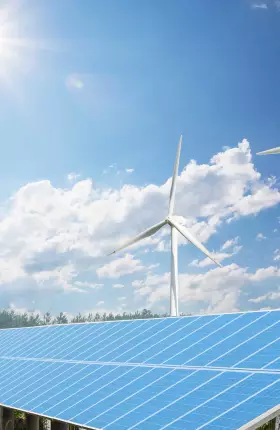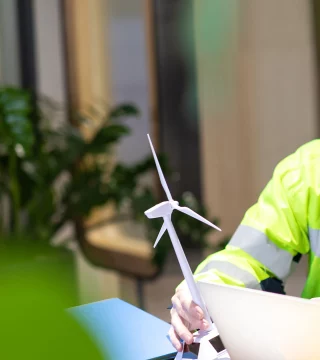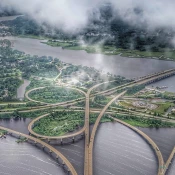Accelerating an Equitable Transition: A Data-Driven Approach
As leaders around the world commit to reducing carbon emissions, it is critical that principles of economic equity are embedded in decarbonization strategies. Climate action has stalled in many countries owing to public protests against the rising price of fossil fuels, job losses, and other social and economic inequalities. A just transition is imperative.
The problem is that leaders do not have solid metrics for assessing the economic and social impact of their climate initiatives. Some metrics assess green transition efforts, while others assess social outcomes—but few address the intersection of the two.
This data gap creates a barrier to action. Leaders are naturally more hesitant to set bold climate targets when they don’t have a clear sense of the unintended consequences.
To address this gap, WEF and BCG have collaborated on research to help countries anticipate the economic equity risks of climate action on workers, consumers, and businesses. The research highlights six archetypes of countries that share similar challenges and opportunities (in terms of potential job losses, green premiums, access to capital, and the like) when shifting to a low-carbon economy.
The archetypes include the following:
- Inclusive Green Adopters. High-income, diversified, service-driven economies with advanced levels of innovation and technology, such as the UK, Switzerland, and France.
- Emerging Green Adopters. High- and upper-middle-income economies, predominantly service-oriented, typically from Central and Eastern Europe.
- Fossil-Fuel Exporters. High- and upper-middle-income, fossil-fuel-exporting economies, primarily from the Middle East and Central Asia.
- Growth Economies. Lower- to upper-middle-income economies, with significant levels of employment in agriculture and industry, such as Brazil, India, Turkey, Vietnam, and South Africa.
- Frontier Economies. Low- and lower-middle-income countries, with higher-than-average GDP from agriculture, primarily from Sub-Saharan Africa and Asia.
- Green Developers. High-income, industrialized economies and global leaders in green innovation and financing, such as the US, Germany, and Australia.
By identifying the archetype that most closely matches their own context and circumstances, leaders can assess their readiness to address the economic equity risks arising from climate mitigation. Countries in a given archetype may leverage similar strategies to strengthen inclusion and ensure that their climate mitigation policies will alleviate, rather than exacerbate, inequality.
Accelerating an Equitable Transition
As we work to accelerate the climate transition, we must in parallel address an equally important imperative: ensuring that the transformation required to reach net zero does not increase inequality and leave people behind.
The need to take action on this front is only growing more urgent. We must rapidly accelerate decarbonization efforts between now and 2030 in order to avoid dangerous tipping points that come with continued rapid warming. While critically necessary, this pace could result in more disruption and inequity if social implications are not effectively addressed.
The World Economic Forum’s Equitable Transition Initiative has been created to advance a green and fair transition, centered on economic equity. By focusing on economic equity, the initiative aims to assess the impacts of climate mitigation actions on people and mobilize businesses and governments to maximize opportunities and minimize risks. To set the foundation for this work, BCG and the World Economic Forum have developed a framework for economic equity to identify the costs and benefits of a shift to a low-carbon economy for workers, consumers, and entrepreneurs.
A Framework for Economic Equity
The climate transition comprises several green transition shifts: the shift away from fossil fuels and toward low-emission energy; the greening of transportation, agriculture and food production, heavy industry (such as steel, chemicals, and cement), infrastructure and the built environment; and the move to a circular economy. To understand how we can advance an equitable transition, we must look closely at where those shifts can generate inequity.
Although equity is a function of multiple factors, we focus primarily on the direct economic factors that shape equity for workers, entrepreneurs, and consumers. In the context of the climate transition, we identified five key equity dimensions:
- Employment and Job Transition. Significant impacts are expected on workers across industries. According to estimates from the International Labour Organization, while 103 million new jobs will be created by the shift to a green economy by 2030, 78 million workers will lose their jobs and many more will require upskilling.
- Accessibility of Products and Services. There is a risk that some groups will have limited use of both green and traditional offerings and will therefore be left behind in the transition. EV infrastructure, for example, is less commonly available in rural regions.
- Affordability of Products and Services. New technologies and processes required to create “greener” alternatives can come with higher costs, leading to high prices for consumers. That will penalize those with low incomes.
- Access to Financing and Investments. The average annual need for climate finance in 2030 will be $9 trillion, according to Climate Policy Initiative, while current flows are at $1.3 trillion. Unequal distribution of finance flows across industries and business can slow down the transition for some.
- Access to Capacity. In addition to finance, capacity (such as knowledge, technology, patents, and resources) is required to drive the transition. The concentration of know-how can drive inequality.
At the intersection of each green transition and equity dimension, there are both challenges and opportunities for an equitable transition.
For example, roughly 13 million fossil-fuel-related jobs are likely to be lost globally as society moves away from fossil fuels, according to the International Energy Agency. This will trigger the redeployment of significant numbers of workers and will result in the outright displacement of some groups.
Meanwhile, the transition to low-carbon energy sources will create millions of new jobs, remote and rural areas are likely to gain better access to electricity, and consumers in some markets will benefit from lower electricity costs over time.
Mobilizing Action to Advance an Equitable Transition
Systemic solutions will be required to address the challenges and capitalize on opportunities. The World Economic Forum’s Equitable Transition Initiative will serve as a platform to connect stakeholders, develop insights, and build consensus on the necessity, vision, and organizing principles for an equitable green transition. The ambition is to ensure that the shift toward a low-carbon future places people—together with the planet—at the center.
Meet the Project Advisors
Related Project Content









